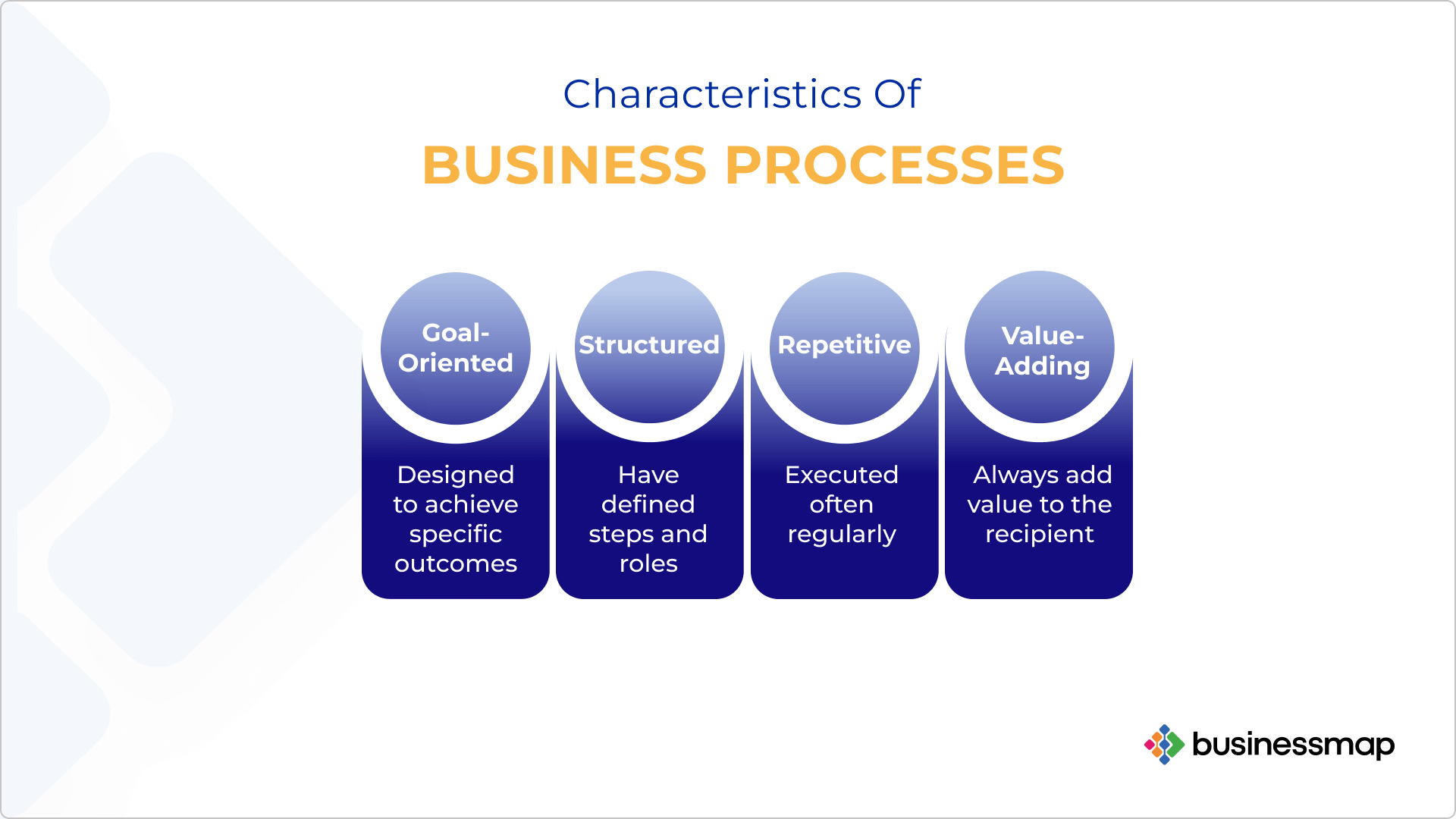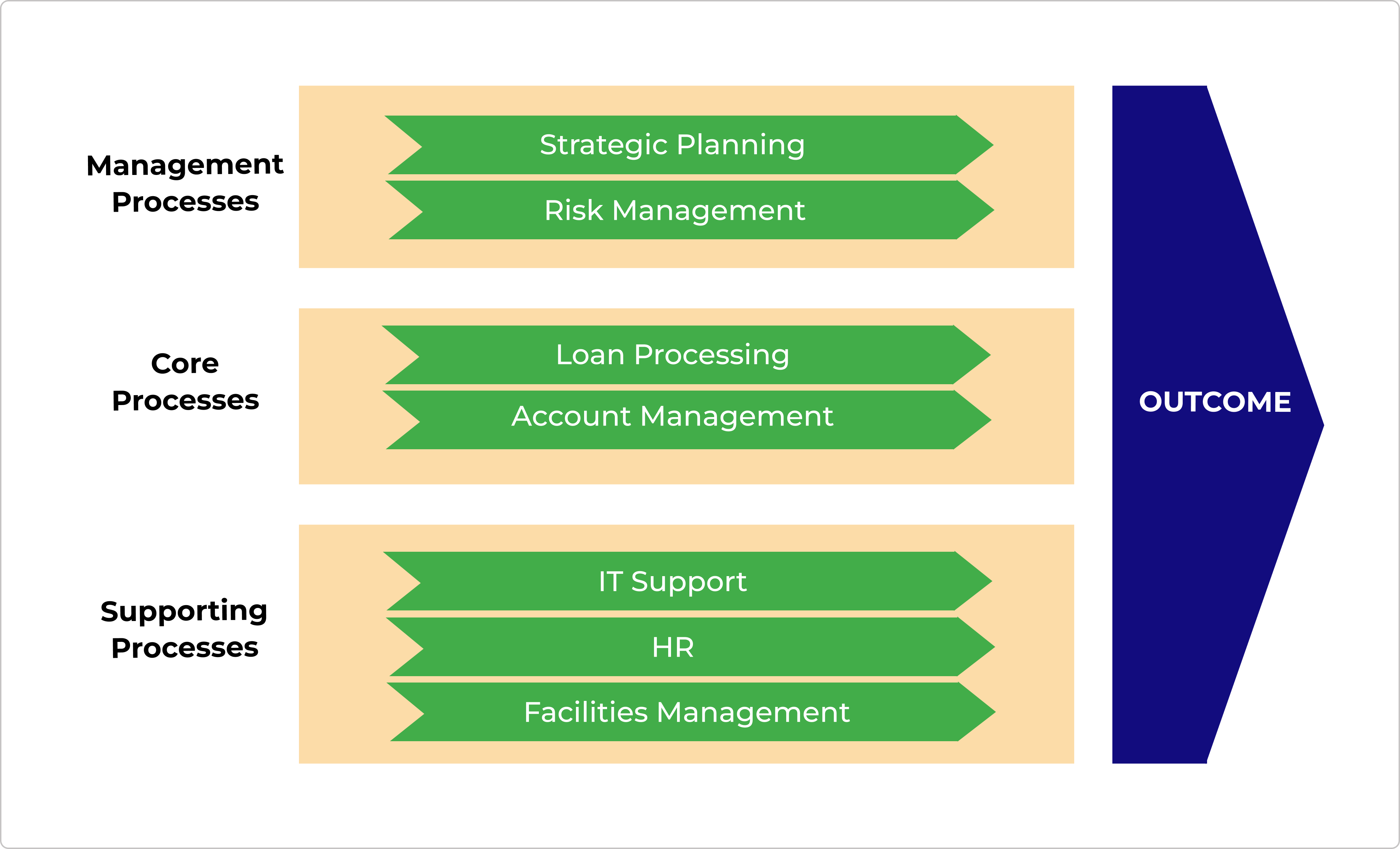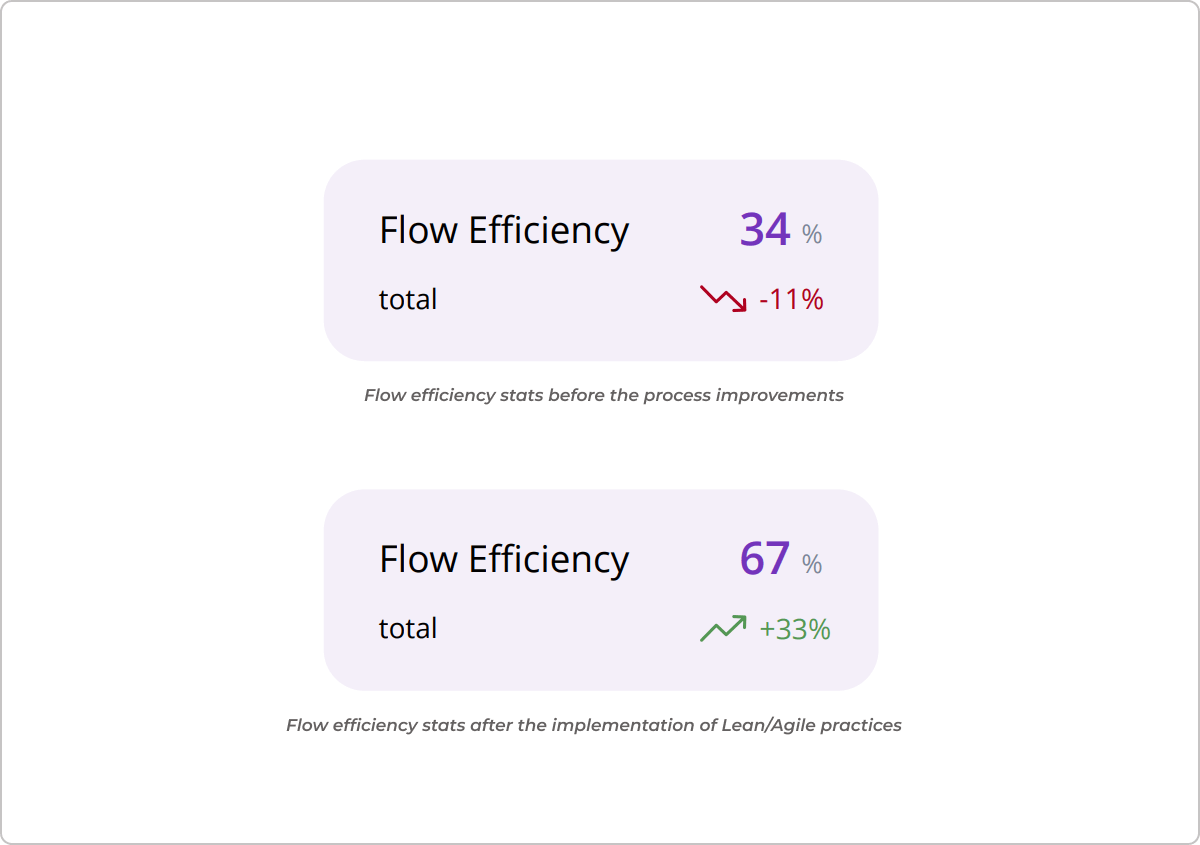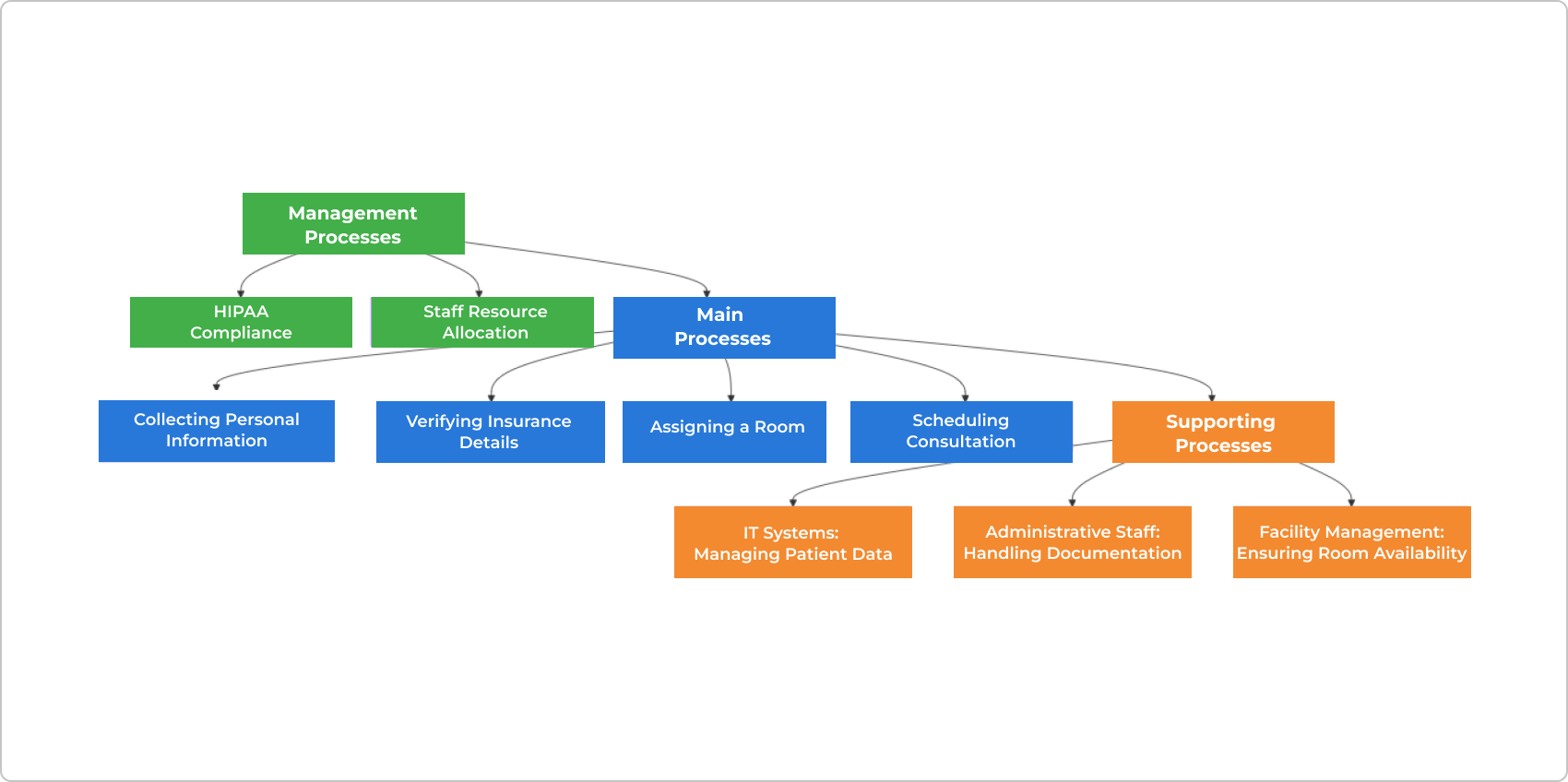If we think of an organization as a house, its business processes are the building blocks of the home. Just as walls create the spaces where life unfolds, business processes shape how work "flows," enabling efficiency, consistency, and growth. Without solid walls, a house would fall apart; similarly, without well-designed processes, an organization loses its stability and direction, leaving its goals out of reach and its potential unfulfilled.
Let's discuss business processes in more details.
Understanding Business Processes
Business processes are the backbone of any organization. They consist of a series of interconnected tasks or activities, all aimed at achieving a specific organizational goal. Regardless of industry, these processes are essential for improving efficiency, ensuring consistency, and driving overall performance.
Defined by Thomas Davenport in 1993 as "a structured, measured set of activities designed to produce a specific output for a particular customer or market," business processes highlight the importance of clarity and purpose in organizational workflows. They can be structured with clearly defined steps and roles; there are also unstructured business processes (UBPs), allowing flexibility and adaptability. Often, they involve multiple stakeholders, diverse resources, and advanced technologies working in harmony to achieve the desired result.
By focusing on well-defined and optimized processes, organizations can ensure they are aligned with their objectives while effectively meeting customer and market demands.
Key Characteristics of a Business Process
Business processes share key characteristics that define how they function within an organization.
-
Goal-Oriented, designed to achieve specific outcomes;
-
Structured, with defined steps and roles;
-
Repetitive, often executed regularly;
-
Value-Adding, always adding value to the recipient.
Organizations rely on business process management tools to ensure these processes are efficient and effective. Such software can help you model, monitor processes, and optimize workflows based on data and real-time insights.

Key Performance Indicators (KPIs) are also commonly used to measure the performance of business processes, tracking factors such as speed, cost, quality, and customer satisfaction to ensure processes align with organizational goals and deliver continuous improvement.
Types of Business Processes
Business processes can be grouped into three core types, each serving a specific role within an organization:
-
Core Processes: Core processes are the essential activities that directly contribute to delivering products or services. They form the organization's backbone, create value, and drive revenue.
-
Management Processes: These processes focus on overseeing and guiding the core activities. They include planning, budgeting, and monitoring, ensuring that core processes are executed effectively and aligned with the organization's goals.
-
Supporting Processes: While not directly involved in product creation or decision-making, supporting processes are crucial for providing resources and ensuring that core and management processes run smoothly. They set the conditions for success, such as human resources, IT systems, and administrative functions.
These processes work harmoniously to achieve the desired outcomes and ensure an organization operates efficiently.
 Business process types for financial services, ensuring compliance and growth
Business process types for financial services, ensuring compliance and growth
Why Understanding Business Processes Is Crucial?
Business processes are vital because they provide a structured approach to achieving organizational goals, ensuring efficiency, consistency, and optimal resource utilization. Adequately designed and optimized processes improve productivity, reduce costs, and enhance customer satisfaction, directly impacting profitability and growth.
The Role of Business Processes in Organizational Success: 3 Real Stories
Improving Efficiency and Reducing Costs
Turkish dairy producer AK Gida optimized its production and supply chain operations by enhancing workflow visibility and automating key processes. This streamlined approach reduced lead times, eliminated bottlenecks, and resulted in a 20% increase in production efficiency, leading to significant cost savings and faster customer response times, improving customer satisfaction and market competitiveness. (AK Gida Case Study)
Enhancing Customer Experience
Business process improvements can directly boost customer satisfaction. For example, Encoparts, a global logistics organization, applied Agile and Lean principles to optimize its international purchasing process. By mapping their workflow, they identified inefficiencies, eliminated non-value-adding activities, and addressed bottlenecks. This led to improved operational efficiency, quicker response times, and more reliable service, ultimately enhancing the customer service lifecycle. (Encoparts Case Study)
 Monitoring process efficiency before and after process improvement using the Flow Efficiency feature in Businessmap
Monitoring process efficiency before and after process improvement using the Flow Efficiency feature in Businessmap
Innovation and Process Improvement
Continuous process improvement drives organizational success. Boa Vista, a leading Brazilian financial services company, embraced the Kaizen principles to optimize their workflows. By incorporating Kanban and focusing on incremental, ongoing process improvements, Boa Vista achieved better team collaboration, greater visibility into project progress, and more efficient resource management. These efforts fostered a culture of continuous optimization, leading to increased productivity and smoother operations, aligning the company more closely with its business goals. (Boa Vista Case Study)
How Business Processes Vary Across Industries?
One of the most interesting aspects of business processes is how they differ across industries. This is largely because each sector has unique operations, regulatory requirements, and customer expectations. For example, the processes in a manufacturing company will look very different from those in service-oriented businesses like healthcare.
Healthcare Business Process Example
In healthcare, business processes are carefully designed to ensure patient safety, regulatory compliance, and the efficient delivery of medical services. These processes range from patient admission to diagnosis, treatment planning, and eventual discharge.
 Patient admission process types breakdown ensuring prompt care while adhering to HIPAA regulations for privacy and security
Patient admission process types breakdown ensuring prompt care while adhering to HIPAA regulations for privacy and security
Business Process Types vs. Competency Types
A common challenge organizations face is confusing business processes with competencies - misunderstanding their distinct roles. Processes are structured workflows designed for efficiency and consistency, while competencies are dynamic capabilities that enable strategic adaptability and differentiation.
When competencies are mislabeled as processes, organizations risk overlooking the training, tools, and flexibility needed to stay competitive. For example, treating a responsive customer service process as a "competency" might lead to neglecting critical process optimization.
This confusion can result in rigid operations that fail to adapt to market changes. To avoid this, organizations should clearly separate processes from competencies. Processes should focus on repeatability and efficiency, while competencies must be nurtured to ensure agility and responsiveness. Aligning both will position your business for long-term success in a rapidly evolving environment.
The Future of Business Processes
BPM as a Strategic Driver of Innovation
Recent research emphasizes the growing role of Business Process Management (BPM) as a strategic driver of innovation. By integrating BPM with Knowledge Management (KM), organizations can unlock the full power of digital transformation. This approach leverages organizational knowledge to optimize processes, support decision-making, and create a culture of continuous improvement—not just operational efficiency.
Automation and AI in Business Processes
A McKinsey Global Survey found that over 72% of companies now use AI solutions, with an increasing focus on AI agents to automate and optimize complex workflows, including tasks like travel planning, loan underwriting, and code documentation. AI agents can potentially drive significant innovation by streamlining core business processes. However, to harness this effectively, organizations must invest in robust data management, IT infrastructure, and human oversight to ensure accuracy and alignment with their values.
New-Age Business Process Management
The evolution of BPM in the age of AI signals a shift from a transactional approach to conversational logic. Traditionally, BPM revolved around structured, step-by-step processes focused on transactional efficiency. With advancements in generative AI, a more intuitive and human-centric approach has emerged. Conversational BPM enables natural language interactions with process information and contextual data, offering greater flexibility and engagement.
Integrating conversational and transactional views redefines BPM, blending human intuition with machine intelligence. It paves the way for more accessible, adaptive, and intuitive process management systems, positioning organizations to thrive in an increasingly complex and digital-first world.
Businessmap is the most flexible software
to align work with company goals






 Business process types for financial services, ensuring compliance and growth
Business process types for financial services, ensuring compliance and growth Monitoring process efficiency before and after process improvement using the Flow Efficiency feature in Businessmap
Monitoring process efficiency before and after process improvement using the Flow Efficiency feature in Businessmap Patient admission process types breakdown ensuring prompt care while adhering to HIPAA regulations for privacy and security
Patient admission process types breakdown ensuring prompt care while adhering to HIPAA regulations for privacy and security

